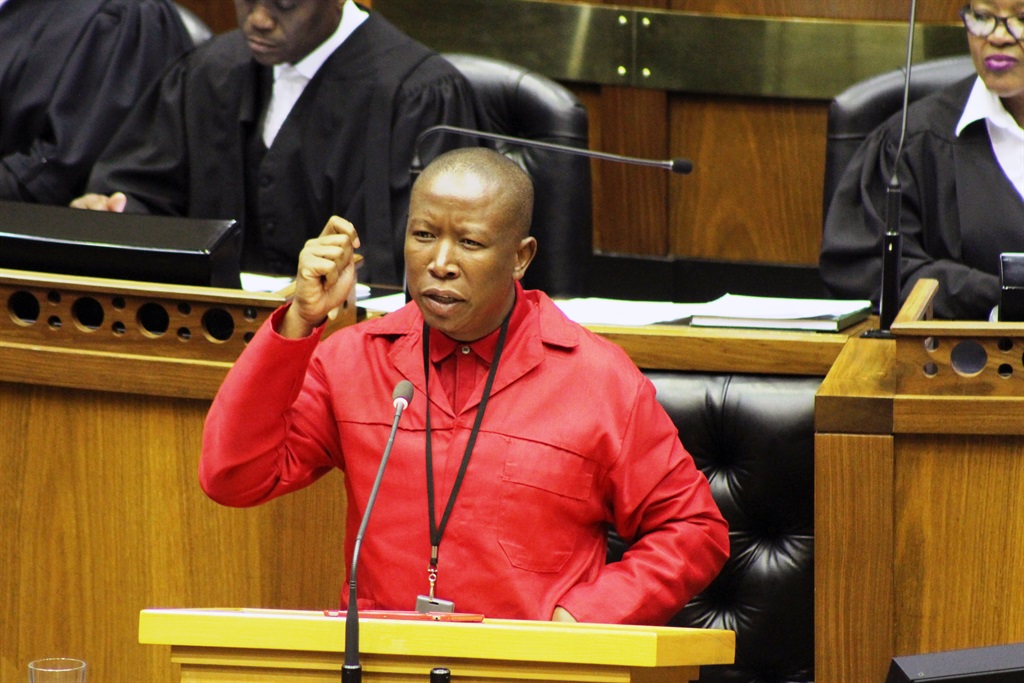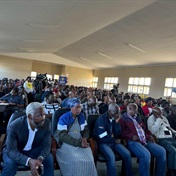
The National Assembly has adopted a motion to investigate the feasibility of land expropriation without compensation and possible review of Section 25 of the Constitution which deals with right of property ownership.
The Assembly overwhelmingly supported the motion brought by the Economic Freedom Fighters and amended by the governing ANC following a heated two-hour debate. A whopping 241 MPs voted in favour of the motion while 83 voted against it. The EFF wants land to be expropriated without compensation for equal redistribution.
The House decided that the matter be referred to the Constitutional Review Committee which is a joint committee of Parliament. This was one of the amendments brought by the ANC to the EFF’s proposal of a National Assembly ad hoc committee which would report back by May 11 this year. The ANC proposed a six month period for the committee to complete its work. In its amendment of the EFF motion, the governing party noted that “the current policy instruments, including the willing buyer willing seller policy, and other provisions of Section 25 of the Constitution may be hindering effective land reform”.
Quoting President Cyril Ramaphosa’s state of the nation address, who described land dispossession as the “original sin”, the ANC recalled that he made a commitment that the government would continue the land reform programme which entails expropriation of land without compensation, making use of all mechanisms at the disposal of the state, implemented in a manner that increases agricultural production, improves food security and ensures that the land is returned to those from whom it was taken under colonialism and apartheid and undertake a process of consultation to determine the modalities of the governing party resolution.
The inclusion of improving food security and increasing agricultural production to the motion aligned it to the resolution of the ANC’s national conference in December, conditions that were initially and publicly rejected by the EFF following that conference and were also missing in its own proposal.
Opening the debate in the National Assembly yesterday, EFF leader Julius Malema traced the history of the dispossession of black people from the arrival of Jan van Riebeeck in 1652 who “declared an already occupied land by native populations as a no man’s land” up to the Land Act of 1913. “Colonial crimes against the humanity of native populations did not end there with the Land Act of 1913; they continued through the forced removals of the Group Areas Act that displaced millions of black people to live in prison camps we now call townships.”
He accused the ANC government of failing to carry the popular mandate when it came to power in 1994 by reinstating land to the dispossessed. “They became drunk in luxury and glory, building false reconciliation without justice.”
He said it was impossible to debate food security and economic development when people did not have the land. “The ability to develop policies on food security depends on land distribution, not the other way around.”
Malema said it took the formation of his party and its arrival in Parliament to return into “the central agenda of human freedom” the need for the land that was disposed through a brutal crime against humanity.
“The time for reconciliation is over. If the grandchildren of Jan Van Riebeeck have not understood that we need our land, that over and above it is about our dignity, then they have failed to receive the gift of our humanity”.
The ANC seemed to agree.
The outgoing Minister of Rural Development and Land Reform Gugile Nkwinti commended the EFF for tabling the motion. “The ANC has been reluctant for 23 years to come to this point where it says what it is saying today in terms of this resolution.”
Nkwinti suggested that the time where the black majority which had been suppressed for hundreds of years was kowtowing to the minority was over. “Let them too recognise that as South Africans, they have a duty to fellow South Africans.” Nkwinti said the ANC was unequivocal in its support of the principle of land expropriation without compensation as moved by the EFF, but disagreed on the modalities.
“On the principle we agree, there is no question about that and we are committed to implementing the resolution of the ANC which resonates very well with the motion led by the CIC of the EFF.”
The ANC resolution that land should be expropriated without compensation speaks to a historical injustice and, as a party in government, the party had a duty to correct that and not fail the people of South Africa, argued Nkwinti. He said land will be expropriated without compensation but this will be implemented in a way that increases agricultural productivity, improves food security and ensures that land is returned to those from whom it was taken under colonialism and apartheid.
Nkwinti also spoke to the land audit that the ministry did last year which reflected that whites own 26.6 million hectares, which is 72% of the total 37 million of farms and agriculture holdings by individual land owners. They were followed by Coloureds at 15%, Indians at 5% and Africans at a lousy 4%.
He explained the importance of the motion being referred to a committee of parliament where people will have a say on the processing of the resolution as a sign of the willingness to persuade and be persuaded.
The Democratic Alliance wouldn’t hear any of it. DA chief whip John Steenhuisen said both the EFF motion and the amendment by the ANC fundamentally misdiagnosed the problem with land reform. Their proposals were short cuts, he said. Steenhuisen cited, as an example, a report of the so-called High Level Panel which was commissioned by Parliament and headed by former deputy president Kgalema Motlanthe which found that there was no need to amend the Constitution and that the problem was “the elite capture of land reform”, the fundamentally broken legislative framework and the lack of the overarching framework for meaningful land reform in South Africa. “We also found that this government for the last 25 years has not put its money where its mouth is. They’ve spent 0.14% of the national revenue on land reform. It’s been on a rapid decline since 2008/09 financial year and that is not a failure of the Constitution but a failure of government and a failure of implementation,” said Steenhuisen.
The Freedom Front Plus, African Christian Democratic Party and Congress of the People stood with the DA in opposing the resolution while the rest of the parties in the National Assembly supported it.
That the House –
(1) notes that South Africa has a unique history of brutal dispossession of land from black people by the settler colonial white minority;
(2) further notes that land dispossession left an indelible mark on the social, political and economic landscape of the country, and has helped design a society based on exploitation of black people and sustenance of white domination;
(3) acknowledges that the African majority was only confined to 13% of the land in South Africa while whites owned 87% at the end of the apartheid regime in 1994;
(4) further acknowledges that the current land reform programme has been fraught with difficulties since its inception in 1994, and that the pace of land reform has been slow with only 8% of the land transferred back to black people since 1994;
(5) acknowledges that the recent land audit claims that black people own less than 2% of rural land, and less than 7% of urban land;
(6) recognises that at the centre of the present crisis regarding the resolution of the land question is section 25 of the Constitution, the “property clause”, which protects private property rights, and requires the State to pay compensation when expropriating land in the public interest and for a public purpose;
(7) further recognises that this property clause makes it practically impossible for those dispossessed of their land to get justice for injustices perpetrated against them;
(8) notes that in his State of the Nation Address, President Cyril Ramaphosa made a commitment that Government would embark on a radical land reform programme that entails expropriation of land without compensation;
(9) further notes that any amendment to the Constitution to allow for land expropriation without compensation must go through a parliamentary process as Parliament is the only institution that can amend the Constitution; and
(10) establishes an ad hoc committee, in terms of Rule 253, the committee to –
(a) review and amend section 25 of the Constitution to make it possible for the state to expropriate land in the public interest without compensation, and in the process conduct public hearings to get the views of ordinary South Africans, policy-makers, civil society organisations and academics, about the necessity of, and mechanisms for expropriating land without compensation;
(b) propose the necessary constitutional amendments with regards to the kind of future land tenure regime needed, taking into account the necessity of the State being a custodian of all South African land;
(c) consist of 11 members, as follows: ANC 6, DA 2, EFF 1, and other parties 2;
(d) exercise those powers in Rule 167 that may assist it in carrying out its task; and
(e) report to the Assembly by no later than 11 May 2018.That the House –
(1) notes that South Africa has a unique history of brutal dispossession of land from black people by the settler colonial white minority;
(2) further notes that land dispossession left an indelible mark on the social, political and economic landscape of the country, and has helped design a society based on exploitation of black people and sustenance of white domination;
(3) acknowledges that the African majority was only confined to 13% of the land in South Africa while whites owned 87% at the end of the apartheid regime in 1994;
(4) further acknowledges that the current land reform programme has been fraught with difficulties since its inception in 1994, and that the pace of land reform has been slow with only 8% of the land transferred back to black people since 1994;
(5) acknowledges that the recent land audit claims that black people own less than 2% of rural land, and less than 7% of urban land;
(6) recognises that the current policy instruments, including the willing buyer willing seller policy, and other provisions of Section 25 of the Constitution may be hindering effective land reform.
(8) notes that in his State of the Nation Address, President Cyril Ramaphosa, in recognising the original sin of land dispossession, made a commitment that Government would continue the land reform programme that entails expropriation of land without compensation, making use of all mechanisms at the disposal of the state, implemented in a manner that increases agricultural production, improve food security and ensures that the land is returned to those from whom it was taken under colonialism and apartheid and undertake a process of consultation to determine the modalities of the governing party resolution.
(9) further notes that any amendment to the Constitution to allow for land expropriation without compensation must go through a parliamentary process as Parliament is the only institution that can amend the Constitution; and
(10) with the concurrence of the NCOP instructs the Constitutional Review Committee to
(a) review section 25 of the Constitution and other clauses where necessary
(b) propose the necessary constitutional amendments where applicable with regards to the kind of future land tenure regime needed.
(e) report to the Assembly by no later than 30 August 2018.




 Publications
Publications
 Partners
Partners








